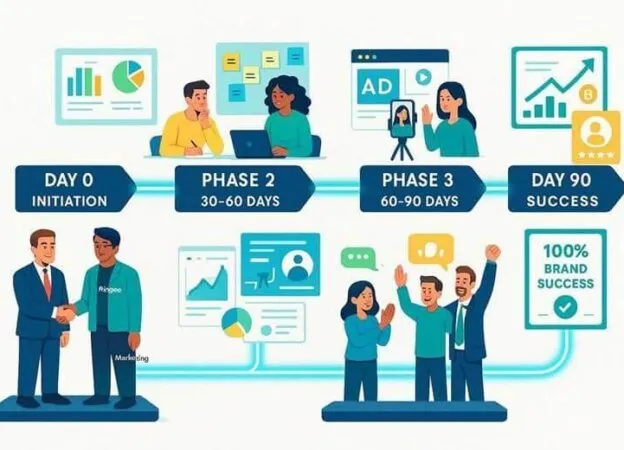A solid online presence is not just an advantage; it’s necessary. For small businesses, Search Engine Optimization (SEO) offers a cost-effective way to attract quality traffic, increase brand visibility, and compete on a level playing field with larger companies.
Table of Contents
This guide will walk you through the basics of SEO and how you can implement effective strategies yourself without breaking the bank.

Understanding SEO
SEO is optimizing your website’s content and structure to rank higher on search engine results pages (SERPs). By improving your ranking, you increase the likelihood of being seen by potential customers when they search for relevant keywords or phrases.
A well-executed SEO strategy can attract more organic, targeted traffic to your website, resulting in a higher conversion rate and potentially more business.

Your DIY SEO Guide
At its core, SEO is about optimizing your website and content to improve its visibility in search engine results pages (SERPs). This involves:
- Keywords: Identifying the terms and phrases potential customers use when searching for products or services like yours.
- On-page optimization: Tweaking elements on your website to make it more search engine-friendly.
- Off-page optimization: Building your website’s reputation and authority through external links and social media presence.
Benefits of SEO for Small Businesses
SEO offers several benefits for small businesses, including:
- Cost-effective: Compared to traditional advertising methods, SEO can be a more affordable option for smaller businesses.
- Increased visibility and brand awareness: By ranking higher on SERPs, your business will be more visible to potential customers searching for relevant keywords or phrases. This increased visibility can also lead to improved brand awareness.
- Targeted traffic: By targeting specific keywords and phrases, you can attract more qualified leads to your website actively searching for products or services like yours.
- Competitive advantage: With a well-executed SEO strategy, even small businesses can compete with larger companies on search engine rankings.
DIY SEO Guide for Small Businesses
Why SEO Matters for Small Businesses?
With limited resources and budgets, small businesses often struggle to compete with larger companies in traditional marketing channels. However, SEO levels the playing field by allowing small businesses to rank high on search engine results pages and attract quality traffic without spending a fortune.
The Impact of Local SEO
Most small businesses’ target audience is usually local. This is where local SEO comes into play – optimizing your online presence to attract customers in a specific geographical area. With the rise of “near me” searches, local SEO has become even more critical for small businesses looking to attract nearby customers.
DIY SEO Guide – Strategies
Keyword Research
Keyword research is the bedrock of your SEO strategy. Use tools like Google’s Keyword Planner, Ubersuggest, or SEMrush to find relevant keywords with decent search volume but not too much competition.
Aim for long-tail keywords—specific, less common phrases that are easier to rank for and attract more qualified traffic. Use keywords naturally and avoid “keyword stuffing,” which can hurt your ranking.
On-Page Optimization
- Title Tags and Meta Descriptions: These HTML elements provide a brief summary of your web page content to search engines and web visitors. Include relevant keywords and create compelling descriptions to improve click-through rates.
- Headings: Use headings (H1, H2, H3) to structure your content, making it easier for readers and search engines to understand the hierarchy and relevance of your content.
- Quality Content: Publish content that provides real value to your audience. Focus on solving their problems, answering their questions, and including keywords naturally.
- Optimize Images: Use descriptive file names and ALT text to help search engines understand the content of your images.
Off-Page Optimization
- Link Building: Earn backlinks from reputable sites in your industry to build your site’s authority. Guest blogging, creating shareable infographics, and participating in community forums can be effective strategies.
- Social Media Presence: While social media links don’t directly influence rankings, actively engaging with your audience on these platforms can drive traffic to your website and increase brand awareness.
Tools for DIY SEO
Leverage free and paid SEO tools to streamline your efforts:
- Keyword Research: Google Keyword Planner, SemRursh
- On-Page Optimization: Yoast SEO (WordPress), Screaming Frog SEO Spider
- Off-Page Optimization: Moz Link Explorer, Ahrefs

Measuring Success
Use tools like Google Analytics to track website traffic, user engagement, and conversion rates. Monitor your keyword rankings and adjust your strategies based on what’s working and what’s not. Remember, SEO is a long-term process, and results may not be immediate.
Stay patient and consistent. With time and effort, your small business can improve its online visibility and attract more qualified leads through effective DIY SEO strategies.
Avoid using termination phrases like ‘End of Document,’ ‘End of Text’, or ‘End of Section.’ Instead, you should write additional content related to the general topics discussed in the content.
Suppose all this is a bit too much. In that case, hiring an SEO agency like Fortis Media can always be possible for more advanced SEO techniques that can help you with your small businesses in different niche markets.
Final Words
DIY SEO for small businesses is achievable with the right approach and tools. By understanding the basics of SEO, implementing strategic on-page and off-page optimizations, and continuously tracking your progress, you can enhance your online presence and drive meaningful results for your business.
Remember, SEO is a marathon, not a sprint—patience, persistence, and a willingness to learn are your best assets.
DIY SEO Guide – Frequently Asked Questions
- Can small businesses compete with big companies using SEO?
Yes, small businesses can compete with larger companies through targeted SEO strategies. Focusing on local SEO and specific niches or keywords allows smaller entities to attract highly relevant traffic, offering a competitive advantage.
- How often should I update my SEO strategy?
SEO is an ongoing process. You should review and update your strategy regularly, at least every quarter. Pay attention to changing search trends, keyword performances, and updates to search engine algorithms.
- What are the most important elements of on-page SEO?
The most crucial on-page SEO elements include title tags, meta descriptions, high-quality content, and keyword optimization. Ensuring your website is accessible and provides a good user experience is also key.
- How can I measure the success of my SEO efforts?
Using tools like Google Analytics, track metrics such as website traffic, engagement rates, and conversion rates. Monitoring your website’s ranking for targeted keywords can also provide insights into your SEO strategy’s effectiveness.



